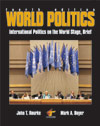Tales of attempts of European Union bureaucrats to regulate everything have become part of the political lore of Europe. One field of contest has been the great food wars of the EU. Skirmishes have been fought over what can be called gouda, brie, and sherry. Greece, for example, persuaded the EU to bar Denmark from exporting what it called feta cheese. Denmark swallowed that, but Danes nearly left the EU when the pride and joy of their apple crop, the Queen Bridgette, was declared too small to move in trade among EU members. Intense negotiations repolished Danish-EU relations, and Denmark remains a core EU member. Many Europeans further reacted with bemusement at the EU's banana contretemps. The details are slippery, but it all stemmed from a bunch of regulations promulgated by the EU bureaucracy that, among other things, specified that imported bananas had to be at least 5.5 inches long and 1.1 inches wide, and could not be abnormally bent. Great Britain, where archeologists in 1999 uncovered the remains of a banana skin dating back to the mid-1400s, was especially attended. "Brussels bureaucrats proved yesterday what a barmy bunch they are by outlawing curved bananas. The crazy laws were drawn by thumb-twiddling EU chiefs who spent thousands on a yearlong study," protested the British newspaper, the Sun. An EU spokesperson replied that while, indeed, bananas of an abnormal shape could not be imported, that "in no sense" meant that EU regulation banned "curved bananas because a curve is a normal shape for a banana."1 Once the Europeans agreed on what a banana was, they also agreed to impose lower tariffs on bananas from their former colonies than on bananas from other places. That nearly set off a banana war with the Americans because many of those other places were Caribbean and Central American countries close to the United States. Washington then butted heads with the EU by threatening to retaliate by barring cashmere and other EU products. This got the goat of Scottish cashmere producers. In the end, the two economic superpowers were able to escape the horns of this dilemma by agreeing that the EU would gradually end its preferences for its bunch of favored countries and equally admit the bananas from the U.S.-favored bunch of countries. The reputation of the Eurocracy was further darkened by the chocolate imbroglio. Having decided that bananas could indeed be bent, at least somewhat, and in the right places, EU policymakers turned to the sticky issue of what constitutes chocolate. The battle line was drawn between the eight EU countries that require chocolate to consist entirely of cocoa butter and the other seven EU members that allow up to 5 percent vegetable oil in chocolate. Representing the purists, the head of the Belgian chocolate company, Godiva, proclaimed that only "100 percent chocolate should be called... chocolate." Answering back for the nondoctrinaire chocolatiers, a representative of Great Britain's largest chocolate maker, Cadbury, urged, "Let's celebrate Europe's regional diversity and recognize that there are different ways of making chocolate." The purists won the first round when the European Parliament voted 306 to 112 in favor of their position. But the war was not over, for the European Council of Ministers had to make the final sticky decision. "Whatever we do will be attacked from one side or the other," an EU spokesperson has complained. Compromise was the sweet solution. An early 2000 ruling declared that chocolate with vegetable oil could be shipped throughout the EU. Moreover it could be labeled chocolate, but in the seven nonpurist countries. In the purist eight, it would have to be labeled "family milk chocolate." Not that it has anything to do with families or milk. Ah well, as Forrest Gump mused, "Life is like a box of chocolates." Notes 1. New York Times, October 6, 1994, p. A16. |



 2002 McGraw-Hill Higher Education
2002 McGraw-Hill Higher Education